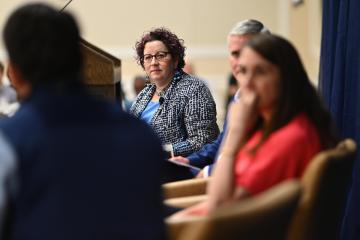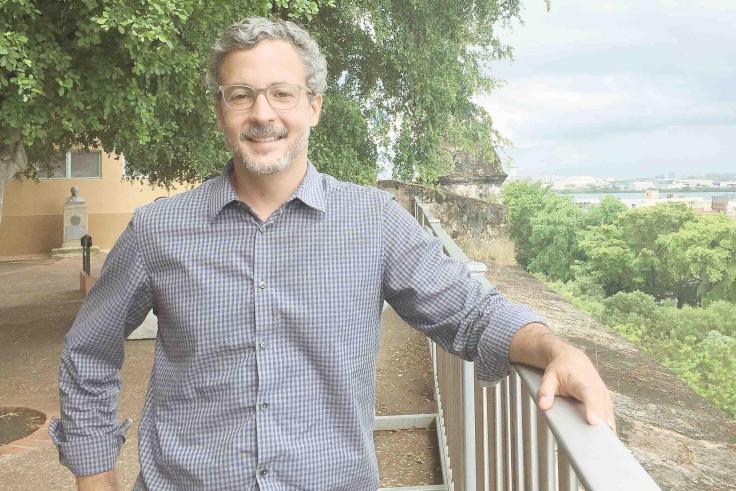
Affiliate Spotlight: Gustavo J. Bobonis on advancing evidence generation and use in Puerto Rico
In this Evidence Champion series, J-PAL North America is recognizing individuals in our network who have made extraordinary contributions to the field of evidence-based policymaking. This piece features the work of Gustavo J. Bobonis, our inaugural researcher recipient. Gustavo is a professor of economics at the University of Toronto whose research interests span multiple sectors, including education, political economy, development economics, and labor economics. In this post, we highlight why Gustavo was first drawn to economic research, how he approaches research agenda building, and his advice to researchers for building strong partnerships to advance evidence-based policymaking.
A research agenda informed by lived experience
Growing up in Puerto Rico, Gustavo frequently observed the ups and downs of the economy around him through changes in the infrastructure, public services, the cost of living, and employment opportunities of his family and friends. He saw different countries in the region developing more quickly than Puerto Rico and began wondering: what might work to help people in Puerto Rico and create a more stable economy? Why are some countries growing much faster than others, and what can we learn from them?
These experiences prompted Gustavo’s interest in studying economics in hopes of answering policy-relevant research questions. Today, Gustavo seeks to answer the question, “How can we support the governments to better deliver on their mandate of providing public goods and services to citizens?”
In his career as an economist, Gustavo has worked across several areas of study, aiming to make connections across sectors. He is vocal about his belief that evidence-based policies and programs must touch multiple parts of a person’s life—schooling, health, housing, employment, and more—to effectively improve key life outcomes. He remarked, “In the field of economics, we sometimes live in a world of silos relative to other disciplines. And I think we can benefit from taking a more interdisciplinary approach. The area of public health is a good example of this approach. There's been quite a bit of work in Puerto Rico—researchers in the health sciences are working closely with environmental scientists. I think that type of collaboration is key.”
Building opportunities for evaluation in Puerto Rico
In 2013, Gustavo initiated a working relationship with several government entities in Puerto Rico. Recognizing the extensive research done on best practices in North America, particularly in education, Gustavo was determined to build a research agenda focused specifically on the Puerto Rico context. “We wanted to learn about best practices from a North American, or even a global perspective, but we also wanted to learn what works in Puerto Rico. What is necessary for effective implementation in a very particular setting, for a context-specific challenge?”
Over the course of this long-term partnership, Gustavo and his colleagues have built and sustained genuine relationships with multiple policymakers at the Puerto Rico Department of Education (PRDE). There has been an urgent need to identify what works in Puerto Rico, setting the stage for several evaluation opportunities. Gustavo heavily credits the government stakeholders with acknowledging that change was needed, and their willingness to engage in evidence-based policymaking to make lasting changes, specifically in the education system.
Emily Goldman, a partner with whom Gustavo has worked closely on several evaluations, commended Gustavo’s commitment to supporting state and local governments in his research endeavors. “Gustavo understood early on in his collaboration with the PRDE that evidence-based policymaking had to go hand-in-hand with technical assistance to policymakers. In our context, that piece was particularly important, yet it is relatively unconventional in the realm of research-practice partnerships. His deep understanding of the context, and his commitment to helping construct the enabling conditions for research projects to succeed, have been vital to the survival and flourishing of evidence-based policymaking projects at the PRDE.”
When reflecting on what led to so many successful research projects with the PRDE, Gustavo credited the collaboration and the steadfast commitment of partners at the PRDE to serve the people of Puerto Rico. As Gustavo noted, “The risk that government partners take when making the brave choice to evaluate their programs cannot be overstated. This decision demonstrates an immense commitment to the people that they are hoping to serve with their programs.”
Gustavo’s work has produced meaningful insights for several government agencies in Puerto Rico. He hopes that his research findings will have lasting policy influence beyond the publication of results. Orlando Sotomayor, who has been a research partner on several projects, reflects, “Research by Gustavo and colleagues establishes that school closures do not necessarily undermine student achievement and can, in fact, generate substantial improvements if planned in such a manner as to minimize costs and maximize benefits. Other research projects are only beginning to yield research results useful for policy, an early one being that school principal training programs carried out at scale can have large impacts on management practices. Soon we will determine whether these changes result in improvements in student academic outcomes.”

Influencing policy beyond the publication of results
As an inaugural J-PAL North America Evidence Champion, we asked Gustavo what advice he would give to other researchers hoping to influence policy beyond the publication of rigorous research results. Following the acknowledgment of the risk that partners take by undergoing rigorous research, Gustavo noted the importance of elevating the implementing partner and their work in the evaluation process. As researchers, publishing rigorous evaluations is an important career advancement. To sustain true partnerships, it is important that implementing partners receive similar professional accolades for their roles in the project. Gustavo reflected that “oftentimes it involves actually getting the word out about the research and the work being done, not just in academic circles, but in conferences and to other media outlets that are useful for our partners in their careers.”
Gustavo also highlighted the importance of coalition building. “These are really challenging problems that we are trying to solve. It requires a relationship of trust that can sustain the work even when things go wrong. It also requires a deep interest in the populations we are centered on as researchers, with policymakers, who are mandated to serve those populations.”
Gustavo has exemplified this in his work with several different government agencies in Puerto Rico. Emily Goldman reflected that “Gustavo's work really highlights the importance of coalition building in evidence-based policymaking. His work with the PRDE has entailed working with more than six heads of agency over as many years, and the fact that the projects have survived these many transitions is a testament to his ability to garner support for evidence-based policymaking at all levels of government.” Among myriad stakeholder groups, Gustavo has excelled at fostering and maintaining project buy-in, building a track record of successful projects, and seeing findings through to lasting policy change.
Reflecting on how the landscape of evidence-based policymaking has changed in Puerto Rico over the last two decades, Gustavo remarked, “Something that has been missing until now is the ability to lead this very close collaboration between government policymakers, researchers, and other actors who are interested in being catalysts for change. The collaboration of those three groups is what's making a difference in changing the landscape of evidence-based policymaking.”
Gustavo would like to thank the broad team of researchers, policymakers, and practitioners who are partnering with him to make this work possible:
- PRDE: Damarys Varela Vélez; Jeanine Ortiz Morales
- Forward Society Lab (UofT): Emily Goldman; Orlando Sotomayor; Raji Jayaraman; Joaquín Klot; Nicolás Riveros Medelius; Co-researchers; FOS Lab Affiliates; and Staff
- Universities: Department of Economics, University of Toronto; Universidad del Sagrado Corazón; Universidad de Puerto Rico
- J-PAL Regional Offices: North America and Latin America and the Caribbean (LAC)
- Funders: William T. Grant Foundation; Spencer Foundation; Social Sciences and Humanities Research Council of Canada; Arnold Ventures; Bill & Melinda Gates Foundation; Khan Academy
- Other partners: Braxton School of Puerto Rico; Coschool; Lead Collaborative; Coalición Todos a Leer


